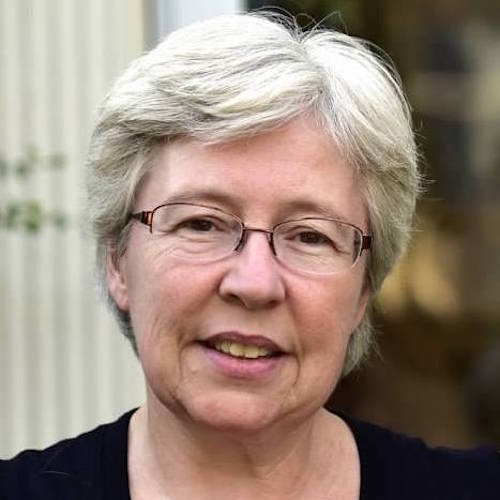The Publishing Industry Adapts to COVID-19 While Offering Support
Navigating bookstore and school closures, publishers innovate while helping those in need. The Internet Archive's National Emergency LIbrary draws backlash.
 |
Photo by Cacophony (Wikipedia) |
The COVID-19 pandemic has kicked off a series of changes in the American book world that may well lead to permanent changes down the line.
Among the most immediate effects were the closing of numerous bookstores, while others shifted to curbside delivery only; the cancellation or postponement of major events, including Book Expo America and the American Library Association’s Annual Conference; and a shift toward digital media and online events.
Residents of 29 states and a number of additional cities and counties have been told by government leaders to stay home, and schools, libraries, and bookstores, along with “non-essential” businesses, have been closed for the foreseeable future. Barnes & Noble has temporarily closed over 370 of its stores for in-store shopping, but is offering curbside pickup in most of those locations; other stores have reduced hours.
Nonetheless, print book sales were up for the week ending March 21, with a 66 percent increase in juvenile nonfiction that was at least partly attributable to the widespread school closings and the sudden shift to at-home learning, according to Publishers Weekly. After Powell’s Books in Portland, OR, reportedly laid off about 85 percent of its staff on March 15 when it closed five stores, the bookseller re-hired 100 of those employees due to online sales demand, Forbes and other outlets reported.
Services for homeschooling
Publishers were quick to set up services for the homebound. Penguin Random House moved up its “Read Together, Be Together” campaign, which was originally scheduled for the summer but instead launched the week of March 23. The campaign, developed in partnership with Parents magazine, encourages parents and caregivers to read with young children. The campaign includes live picture book readings via Instagram and Facebook, as well as resources for parents. The rest of the campaign will be rolled out in early summer. PRH has also put up a resource page for parents, teachers, and librarians, and a Reading Through It Together page for parents and children.
HarperCollins set up a new web page, HarperCollins at Home, with links to programming across a variety of platforms, including YouTube, Instagram, and podcasts. Offerings include video storytime for children, book recommendations via chat for teens, and resources for educators (including newly drafted parents) and librarians.
Little, Brown for Young Readers (LBYR) boosted its regular slate of author events, which include “Ask Me Anything” sessions and the “NOVL Tea” talk show, both aimed at young adults and hosted on Instagram. The publisher also added weekly drawing lessons in which artists explain how to draw their characters; the biweekly “Lunch Bunch Book Club,” a 10-minute Instagram chat about a middle-grade book, will debut on April 2. LBYR is even planning an online book festival, Couchfest (April 20-24), which will include author events, book giveaways, and other promotions.
Simon & Schuster’s site The Book Pantry provides reading guides, a digital catalog, and other resources, and Macmillan’s Online Resources and MacKids School & Library Site include downloadable activities, teaching guides, and more.
Scholastic has set up a Learn at Home page, and “Dog Man” creator Dav Pilkey will launch Dav Pilkey at Home, in collaboration with Scholastic and the Library of Congress, on April 1 and will star in a new online video every Friday morning.
Delays hit comic shops
While book publishers with long lead times are not announcing many delays, the comics industry has been hit hard. Diamond Comic Distributors, the sole distributor of monthly comics to comic shops, has suspended operations beginning this week. That means that shops will not be able to obtain new print comics, although graphic novels may still be available through other distributors.
Since most new comics are released digitally and in print on the same day, publishers have had to consider whether or not to delay digital releases, too. Marvel Comics, one of the two largest comics publishers, has announced it will not publish new comics digitally on April 1, and DC has apparently postponed its digital releases from April 1 to April 29.
Smaller publishers have voted to hold off on digital editions too. “In support of comic retailers in this trying time, we will not be releasing any comics digitally that are not also available in print,” says Kate Jay, PR and social media coordinator for Dark Horse Comics. “We still have collections, original graphic novels, and art books shipping through our bookstore distributor Penguin Random House, from whom comics retailers can also order.” BOOM! Studios will also halt digital releases of single-issue comics until the print copies are available, although graphic novels will stay on schedule.
For the most part, the effect of Diamond’s action on bookstores will be minimal, as most graphic novels are handled by other distributors for the book channel. However, the retail site ICv2 reports that Diamond Book Distributors, which handles distribution of Image, Dynamite, and Udon titles, has shut down temporarily.
Helping hands
With children out of school (meaning many are not getting school lunches) and independent booksellers in a precarious situation, publishers are partnering with nonprofits to help ease the burden.
Scholastic has started the #SAVEWITHSTORIES initiative on Instagram; the campaign will feature celebrities discussing their favorite children’s stories and encourage donations to Save the Children’s COVID-19 response.
Abrams has launched the hashtag campaign #HELPABOOKSELLER, with the goal of raising $100,000 for the Book Industry Charitable Foundation (BINC). Abrams will donate at least half of the $100,000 but is encouraging others to pitch in as well; “Diary of a Wimpy Kid” author Jeff Kinney and other children’s and adult authors have already signed on.
Shifting to digital--and courting controversy
As bookstores and warehouses close, publishers are taking steps to make their digital products more affordable to schools, libraries, and individuals.
Penguin Random House announced on March 17 that it would discount the prices of
ebooks and audiobooks sold to public and school libraries through wholesalers. The discount will be in effect for 90 days.
The distributor IPG is also offering discounts, including a 30 percent price reduction on ebooks for public and school libraries.
The library digital distributor hoopla has created a Bonus Borrows collection of 1,100 digital titles that will be available at no added cost to libraries until April 30. Overdrive is also adding free and inexpensive books to its collections.
One digital initiative has raised hackles: The Internet Archive’s National Emergency Library is a digital library whose holdings include both books in the public domain and titles that are still in copyright, many of which have been scanned in. (The Universal School Library is one of the archive’s collections.) For books that are not in the public domain, the library has adhered to the principle of Controlled Digital Lending (CDL), which states that a library may loan as many copies as it has “legitimately acquired.” Thus if a library has digitized one of its print copies of a book, it must withdraw a print copy from circulation if the digital version is loaned out.
This was already controversial, with many librarians and lawyers supporting it and author and publisher groups such as the National Writers Union opposing it. What changed last week was that the Archive suspended its waitlists through June 30, or until the COVID-19 emergency ends. This did away with the controls, allowing an unlimited number of users to access the books at the same time.
While this initiative drew support from many quarters, it was also denounced by authors and the Authors Guild. The Internet Archive has stated that authors can request that their books be removed from the Emergency Library.
Resources
Check here for updated information on the book world and its responses to COVID-19:
The Association of American Publishers has a list of publishers’ actions, including free access to digital and e-book platforms for educators; resource guides for parents, teachers, and librarians; online storytimes and other events for kids; and social media activities.
THE Journal has a list of free educational services, some of which are usually fee-based.
Brigid Alverson is the editor of "Good Comics for Kids."

RELATED
The job outlook in 2030: Librarians will be in demand
The job outlook in 2030: Librarians will be in demand
ALREADY A SUBSCRIBER? LOG IN
We are currently offering this content for free. Sign up now to activate your personal profile, where you can save articles for future viewing






Add Comment :-
Comment Policy:
Comment should not be empty !!!